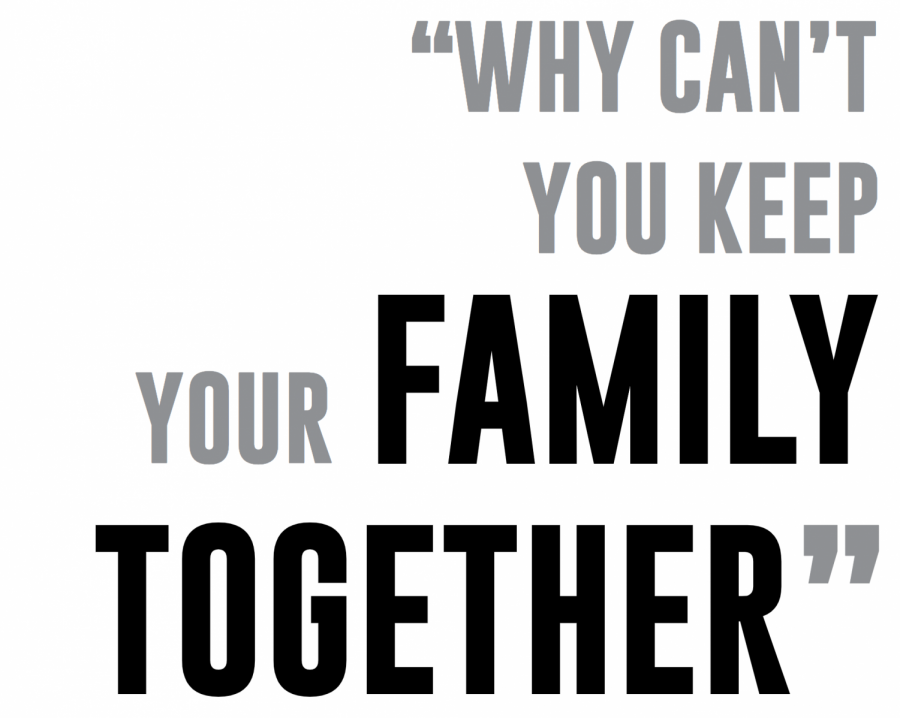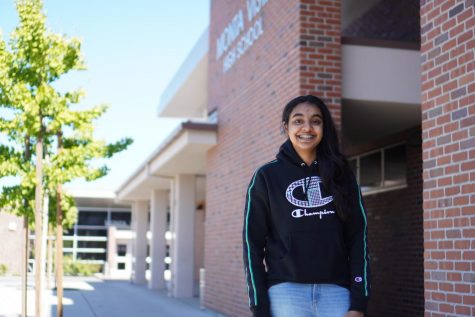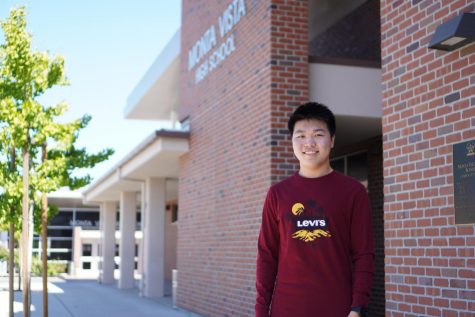Family together: exploring the lives of students and teachers in single parent families
January 10, 2020
Most students of the MVHS community are accustomed to seeing two parents when they come home from school every day. But this experience is not one that is shared by all. According to a survey of 350 MVHS students, 9% of students live primarily with one parent. Below are the stories of three members of the MVHS community who have experienced life in a single parent family.
Jack Tian
Ever since senior Jack Tian can remember, his father was rarely home — instead, he was visiting relatives in China, traveling for work or spending time with friends. Tian’s father would be gone for up to a year at a time, so it was usually just Tian and his mother at home. When his father did return, he usually stayed in his room, so Tian had limited interaction with him throughout his life. Because his mother is his family’s primary source of financial support, she works close to eight hours each day to provide for both him and his brother.
“It’s been more tough since my mom always had to have a job,” Tian said. “So I’ve usually been left alone at home by myself, since my dad was usually traveling. And I just learned how to be a bit more independent. I had to push myself I had to be responsible to do all my homework, because my mom usually comes home late and she doesn’t have time to take care of me as much.”
The few times Tian accompanied his father on trips to places nearby, Tian usually stayed in the car by himself. According to Tian, when his parents got divorced this year, he was not affected because his father has always been distant. However, throughout his childhood, Tian missed having two parents.
“Usually if you have two parents, one parent’s probably going off to work but then you have another parent to help you with stuff like homework or just like playing with you or just like spending time with you basically,” Tian said. “I didn’t have much of that when I was growing up, so I was kind of lonely and sad.”
For Tian, the difference in his family situation was most evident when he spent time at his friend’s houses.
“Whenever I was at my friend’s house or whenever I talked to them, they always had a mom and dad,” Tian said. “I wanted to compare my own family situation at home … to theirs. So I’m just wondering what their family [is] like back at home. And I just can’t imagine it with my own brain so I guess it just made me feel separate from other people, especially when I was younger and I guess I was a bit sad about that.”
Overall, however, Tian believes being raised by a single parent shaped his life positively.
“I think it’s a benefit because it helps me learn and improve for myself in the future,” Tian said. “I guess it would be nice If I did have a more involved second parent, but I think that my life turned out pretty well as it is.”
Shivani Verma
Sophomore Shivani Verma’s earliest memory is sitting in an unfamiliar room at age three playing Candyland with her father. She would always cheat by putting the good cards in her pile, but this time she promised to play fair. After the game, she played with her Barbies with both her parents. A lady with a clipboard sat in the room and asked her if she was having fun.
“I was like, ‘yeah, I love toys,’” Verma said. “I didn’t know what was going on. But it was actually a one way mirror and people were observing how I interact with my parents without me knowing that I’m [being observed]. It was just to see what environment I would interact with them [in].”
Verma’s parents got divorced when she was three years old, and observing her family environment helped agencies determine which parent would have primary custody of her. The result of this test, as well as several other factors, was that Verma would spend weekdays with her mother and weekends with her father.
“I’m really used to the way that everything is,” Verma said. “People who are like, ‘My parents got divorced when I was 10,’ I’m like, ‘Man, that sucks.’ Because I don’t remember my parents ever being together. It’s not a thing for me. People would ask me, ‘Do you wish that they were together?’ I can’t wish that because I don’t know how it was. I’ve been with it so long that I don’t think about it that much.”
Verma’s father eventually remarried, but because her mother is single, Verma recognizes the sacrifices she has made to take care of her child. For example, while Verma’s mother is close to her colleagues at work, she does not have the time to build strong friendships with others because she is so busy, according to Verma.
“She would sacrifice things that she wanted to do for things that I wanted to do,” Verma said. “She used to be really artsy. And she used to sketch. She painted a wall in our house that had butterflies. And it’s really pretty, but she definitely doesn’t have time to do it anymore.”
Despite hearing about the negative aspects of being raised by a single parent, Verma is content with the way her family is structured right now.
“I don’t know what it would feel like to have both of my parents raising me at the same time, and I don’t really want to know because I just like the way it is right now,” Verma said. “It feels like you can be more comfortable. And you’re closer to them in a way because it’s just you and that person.”
Sushma Bana
Math and physics teacher Sushma Bana has been a single parent for 17 years after getting a divorce when her son was three years old. She believes that there are two major challenges to being a single parent. The first is handling all of a family’s responsibilities, such as earning a household income, providing food and doing taxes. The second challenge is dealing with negative judgments made by the community and society.
To Bana, this second challenge of dealing with societal issues was more difficult than the first. Judgemental questions can be very hard to answer, especially for children, according to Bana. In her experience, the Asian community is very judgemental of the notion of divorce, especially towards women.
“‘What did you do to break up your family?’ I have had this question asked bluntly in my face,” Bana said. “‘Why couldn’t you keep your family together?’ So implicitly, it’s considered the woman’s fault, like something is wrong with you; you couldn’t keep a family together. So as much as you try to shield your child or children, this is the piece that I have seen my son also struggle with.”
Bana believes that the people who ask these questions are not uneducated; they simply have a condescending mindset of wanting to “fix” her relationship. She shares that interestingly, women put her down far more often than men do — even those who seem close to her, such as her friends.
“If you are strong, then they feel threatened,” Bana said. “If you are the crybaby then they feel ‘Oh yeah, we can help you.’ But if you’re a strong woman and you don’t need their help, then they don’t take very kindly to it. I’ve had [people say] to my face that ‘Because you have an attitude like this, no wonder your husband left you.’ I’m like, ‘Do you even know who left whom?’ I mean, this judgment that you had something in you that made your partner leave you; it’s just there.”
Bana is subject to these judgements even within the MVHS community. While helping organize the Spotlite showcase of Indian culture one year, Bana walked through the line outside the auditorium, making sure students lined up properly and preventing them from stealing food such as samosas. At one point, she addressed the parents directly.
“I just said, ‘please help the kids,’” Bana said. “‘We are at a school, please help your kids in maintaining the school rules. We are role models for our kids.’ And a parent right there, he did not see me, but I heard with my own two ears: ‘Look who’s talking: a divorced single parent.’ I didn’t say anything. I just said as loud as I could, ‘Well, ignorance is bliss, isn’t it?’ And I just walked away. I never cry in public. But I walked in and the show went on. I’ve never shared this with anyone because I don’t want kids to feel bad. It’s not their fault; [they]’re kids.”
Bana believes that despite all of the criticism and misinformed judgement she receives, she has gained a lot of strength from living as a single parent. In fact, her teaching has evolved due to her experiences; she tries to empathize with students and care for them, and hopes to instill the same kindness in her students.
“It is [a] day to day struggle, but it does make you a better person,” Bana said. “And I truly believe that. I think single parents are more empathetic. They are more resilient. They are more courageous. And they believe in the best and they are hopeful. They don’t lose hope because they have been through things. So they think ‘this will pass. This too shall pass.’”





























